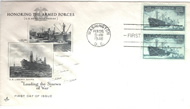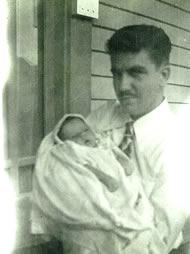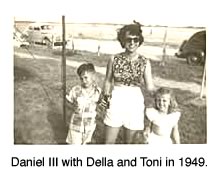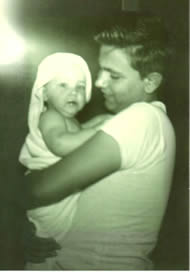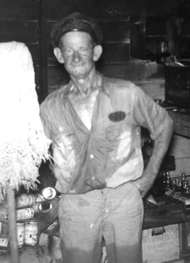After The War
Page 1
Early in 1945 I had gone to the SIU hall in New York and arranged for Della's youngest brother, Henry Lopez, go to sea. I got him a full union book. Normally a man got a union permit to ship and after so much time at sea you qualified for a book. I knew the business agent in New York really well - we were good friends. Later after the war he was the union business agent in Houston. If you had an "in" with the business agent he could do all kinds of things for you.
When I got back to Texas I gave Henry his book and all he had to do was go to the Maritime Commission and get his certificate. I think Henry made his first trip just before the war in the Pacific ended. He was still a teenager and had to get my mother-in-law to sign a waiver so he could go to sea. Henry kept shipping until he finally retired after he was sixty years old. He never married and spent nearly his whole life at sea. Henry qualified as a veteran of World War II and he made trips to Korea during that war and later made a number of trips to Viet Nam during the 1960s. They shot at his ships going up the Mekong River a couple of times.
Henry explained how he saw the differences between the three wars. "During W. W. II a G. I. would pay you anything for a bottle of booze; in Korea a G. I. would pull a gun on you and take the booze; and in Viet Nam you couldn't give booze away because the G. I. 's had more booze than they could drink. " He may have been right on the money about Korea and Viet Nam, I wouldn't know. I know that during my war, liquor was a pretty valuable commodity and not often easy to come by.
Roosevelt was always praising the Merchant Marine and promising to take care of us after it was over. I think that if he hadn't of died that he would have given us veteran status and the G. I. Bill. Roosevelt was responsible for building up the Merchant Marine and he made a speech that "never so much was accomplished by so few". If he hadn't of died I believe he'd have taken care of us and seen that all the promises made to us during the war were kept.
After it ended they were encouraging us to keep shipping. President Truman sent a letter to all merchant seamen that the country still needed us. They kept talking in Congress about extending the G. I. bill to us but that stalled and never went anywhere. All I got for my service was a certificate. I was ready to keep going to sea because I liked the life. At the beginning of 1946 I already had a ship going to South America loaded with molasses when my wife put her foot down. So I stayed ashore. In September 1946 my daughter, Toni Annette Traverso, was born.
I long shored for a while, loading cotton and grain. I got on with the Southern Pacific driving a freight truck. Eventually, I went to work for Falstaff Beer. I worked briefly at the Union Carbide in Texas City when Southern Pacific laid me off - I think there was a strike. I heard they were hiring down at the Falstaff beer distributorship about 1948. My cousin, Don Faust, was the head salesman, the sales manager. I went by to see Don and he said, "sure" he'd put me on. He wanted to fire a driver so I could take over his route but I said I didn't want that and I'd start as a helper or in the warehouse.
Mr. Tom McCarthy owned the Falstaff distributorship. He was a big guy from Montana or some place up north. He was a college graduate and a natural salesman. He was the best boss I ever worked for. Mr. Mac was generous and cared about his employees. He gave me the money to put a down payment on the house I had built at 103 Avalon Way in the late 1950s. He helped my cousin, Don, get set up as a beer distributor himself in Houston. Mr. Mac was a wonderful man and generous to a fault.
The Falstaff corporation bought the old Southern Select Brewry in Galveston and took over the distributorship. They sent down from corporate headquarters in St. Louis guys to run the local distribution right out of the brewry. And were they a crummy bunch of bastards. They treated the workers rotten and they ran the business into the ground. Not long after I left Falstaff they ran the company into bankruptcy.
Mr. McCarthy was the Canada Dry distributor in Houston and I briefly worked for him there. He got a beer distributorship in Phoenix, Arizona and asked me to come out there and work for him. I had driven some of his trucks to Arizona for him. I didn’t like the desert and Della wouldn’t move.
I worked for Falstaff for over nineteen years and became the warehouse manager and Teamster Union stewart until my first heart attack. In January of 1955 my daughter Rose Mary was born. Della and I named her after my great aunt, Don's mother, and my aunt Rose. Don Faust and his wife Mitzi were godparents at my daughter's Baptism. Three years later in June of 1958 my youngest child, Carole was born.
After my first heart attack, Falstaff laid me off. I was just forty one. They put me on permanent sick leave and let me know I would never be allowed back on the job. I was six months shy of retirement. For a couple of years I drove a truck on the construction of the highway bridge from the southern end of Galveston Island to the Texas mainland. Then I drove a construction truck at the Union Carbide refinery in Texas City . But I had another heart attack and finally had to quit working. I guess that Navy doctor back in 1942 knew what he was talking about.
After the war my aunt Rose married a soldier named Rudolf Nelson. She had met him during the war when he'd been stationed at FT Crockett. Rose was 42 when she married and still living with the Bundies. Rudolf Nelson left the Army and went to work for the Galveston Wharves where he became captain of the wharf police. And, during the 50's, My uncle Pete finally got his military disability status with the help of Congressman Clark Thompson.
By the early 1950s Inez Traverso suffered from rheumatoid arthritis. Her doctor began giving her massive doses - shots of cortisone. It was considered a wonder drug at the time before doctors realized that steroids had bad side effects. Inez personality changed the longer she was taking the drug. She became “a different person” and also developed a blood disorder because of the medication. She was taken to the hospital with a failing heart and died on April 11, 1966. She was just sixty years old. Danny and Della always blamed the drastic changes in her personality and her early death on the massive injections of cortisone she was prescribed for over a decade.
"Dan, Sr. retired from the Galveston Fire Dept. a few years before his wife's death." He lived by himself in an apartment above a shop on the Ferry Road. For a while he pumped gas and was the night man at a gasoline station next to his apartment. He enjoyed his independence but lived only several blocks from his son’s house. He became very close to Danny's and Della’s youngest daughter, Carole. Several times he took the bus up to Austin to spend a week with his grandson, Danny III. He remained close to his two aunts who had always been more like sisters, Annie Bunde who was six years older and Rose Faust who was four years older than he. His aunts outlived him. He developed cancer and moved in with Danny, Jr. and died at John Sealy Hospital on November 22, 1976.

